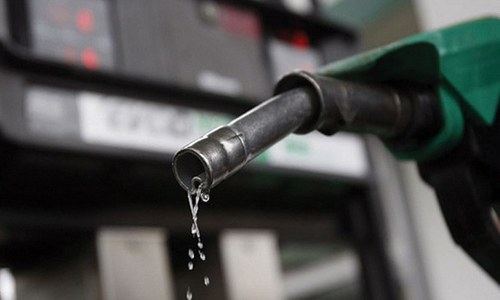ISLAMABAD: The Oil and Gas Regulatory Authority (Ogra) is at loggerheads with a group of 13 leading oil marketing companies (OMCs) over massive storage capacity shortfalls and the expansion of retail networks.
On January 12, Ogra announced that it stopped the 13 OMCs from expanding their retail outlet networks because of their failure to develop proportionate storage capacity required under the government policy. Every OMC is required to ensure product-wise storage capacity as well as stocks for a minimum of 20 days.
The directive came following the historic supply chain disruption of January 2015 that caused serious logistical problems across the country, leading to the removal of top 10 government and industry officials.
The debate re-emerged last week when oil tankers went on strike over taxation issues. Retail outlets started drying up within 36 hours.
An Ogra official said the regulator did not ban the expansion of retail networks suddenly. It has been warning OMCs for more than two years to develop storage infrastructure before expanding retail outlets, the official said.
“In some cases, we imposed penalties on OMCs for expanding retail networks significantly without backup storage, taking the matter a little leniently before going for the extreme step of banning new retail outlets,” he said, adding that the regulator will ensure that all companies develop storage capacity and build stocks proportionate to their product-wise retail networks and sales.
The Oil Companies Advisory Council (OCAC), a representative body of OMCs and refineries, questions the basic premise that the storage facilities are currently insufficient for 20-day stock cover. It called the ban illegal, unfair and counter-productive. This could lead to a larger supply crisis rather than being a solution, it said.
In its latest communication to Ogra and the petroleum ministry, the OCAC contended that the regulator’s calculation of storage capacity and stocks for 20-day coverage was misplaced. Given its mandate, Ogra’s decision to “issue such a ban is questionable” because the regulator did not cite any provision of law under which it exercised the power to impose the ban, the OCAC said.
Also, the ban on new outlets was a violation of Article 18 of the Constitution that gives every citizen the right to carry on lawful business.
The OCAC claimed the supply chain began with imports of premier motor gasoline (PMG) and high-speed diesel (HSD) and stretched from the shore tanks of the OMCs to their movement to the depots by road and pipelines and thereafter to retail outlets that supply the actual product to the consumer. Each retail outlet has its own storage as well. “All these storages must be accounted for when determining the real days’ cover.”
Based on this principle, oil companies have argued that their own storage as well as rented and lease storages at the ports, total in-transit stock (stocks on wheels) and storages at retail outlets must be part of the calculation for the days’ cover. On that basis, it is a lot higher than 20 days for all products, it said.
“Ogra has arbitrarily decided to impose a ban on the retail side development, which is not only hampering the OMCs’ business but also inconveniencing the customer,” it said.
It said the volumes of petrol and diesel had been growing rapidly over the last year, creating new pockets of consumption that required to be serviced through new sites. “Not allowing new sites to develop is not justified and is in fact harming the interests of the OMCs and the consumer.”
The OCAC complained that even when the OMCs planned to build new storage capacity, the Ministry of Defence imposed a ban on new storages at Keamari and Machike with no approvals being given for new storage tanks. “Under such circumstances, no OMC can add new storage even if it wants to,” it said, adding that a ban on retail outlets on top of the storage ban would create more problems for the consumers who get the tanks of their vehicles filled at the outlet and not at the depot.
Ogra imposed a ban on the opening of new outlets by PSO, Shell, Total-Parco, Attock, Hascol, Total-Parco Pakistan, Askar Oil, Byco, Overseas Oil, Bakri Trading, Gas and Oil, Zoom and Admore.
Published in Dawn, April 14th, 2017















































Dear visitor, the comments section is undergoing an overhaul and will return soon.